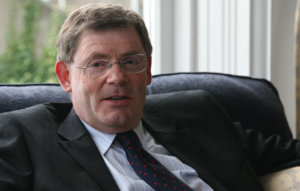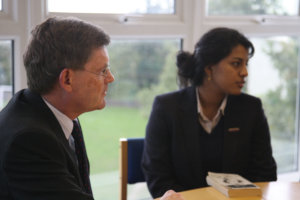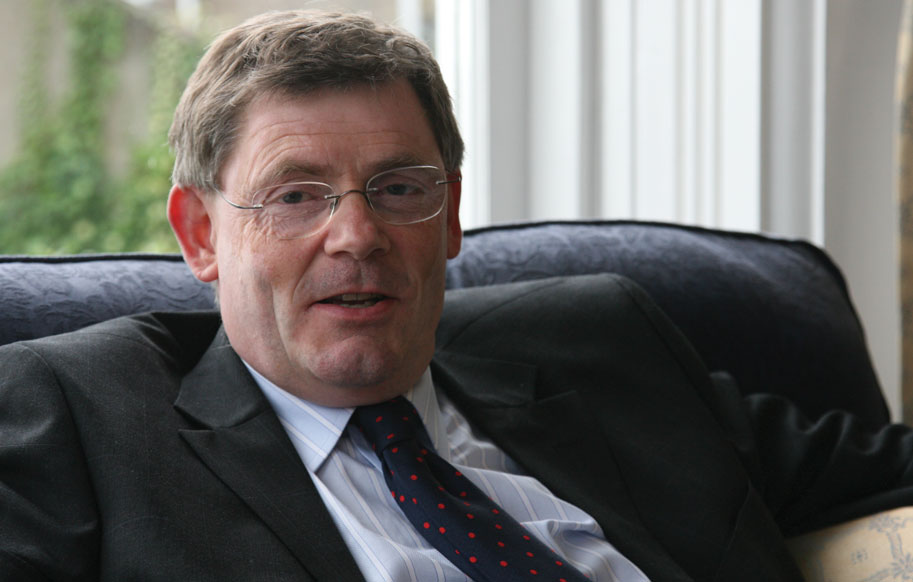 Ryde School’s headmaster Dr Nicholas England feels it’s important to live up to his role – which is why he’s unlikely ever to be caught out wearing anything other than a collar and tie.
Ryde School’s headmaster Dr Nicholas England feels it’s important to live up to his role – which is why he’s unlikely ever to be caught out wearing anything other than a collar and tie.
And also why he felt such acute embarrassment on the one occasion when he thought he would be safe, and left the Island on an early morning ferry wearing bright red shorts and sandals. He says he was mortified to bump into a large group of pupils on the boat – and vowed never to get caught out again.
Few people would regard being caught out in red shorts as much of a cause for angst – but Dr England, head of the independent co-ed school for pupils aged 3-18 says: “The very nature of being the head of a community puts you in a certain position, and my pupils do expect me to look a certain way.”
If that sounds rather staid and old-fashioned, then Dr England is certainly not apologising for it. He admits to having always been something of a “square” – and even the term he uses sounds oddly outdated.
“Obviously I enjoyed my days at university just as much as the next person” he says, “but I think I was always very civilised as a young chap. As an undergraduate I had slightly longer hair and tried a moustache in an attempt to move with the times, but really, I was never a “hip” teacher – in fact I was always fairly old-fashioned”.
Indeed, the reason he gravitated towards teaching was that as a brilliant student of maths, chemistry and physics he always had plenty of friends asking for help with their homework.
“I found that I liked helping them and began to think I would make a good teacher” says Dr England, who studied physics at Oxford and went on to a study of low temperature magnetism for his doctorate.
All of which sounds rather heavy and studious – but Dr England says his extremely happy life as a student also included plenty of sport and music. “We worked hard and played hard” he says.
It’s the idea of that kind of full but balanced life that Dr England aims to instil in the 500 pupils at his school – particularly at a time when there are so many distractions from TV, mobile phones and the Internet.
“The world has changed a great deal since my student days, because of technology” he says, “and I fear that too many families are switched into telly, e-mail and mobile phones. With too much of this virtual interaction, there is a danger of real communication skills declining.
 “I worry about young people spending too much time alone in front of machinery, rather than reading books, listening to music, playing games or interacting with other people.
“I worry about young people spending too much time alone in front of machinery, rather than reading books, listening to music, playing games or interacting with other people.
“I know we cannot change the technology now, but I do think we need to be aware of the danger that if it gets out of balance, it will lessen our children’s skills. We will become less gregarious and less skilled at co-operation and working in groups – which is essentially what sets us apart from other species”.
After 10 years as head, Dr England enjoys the sense of community at Ryde School, where he says pupils are well-behaved and parents generally supportive. Time in the classroom is deliberately not spent watching on-screen presentations, but is more geared to learning through personal interaction.
When it comes to his own personal interactions, though, Dr England admits that being a head can lead to a certain isolation.
“It’s the same with any head of a community” he says, “but as a head teacher your social life is generally not spent with staff or parents, but rather with other heads. It’s not that I am in any way trying to exclude myself, but that’s just the way it is”.
Dr England recalls an amusing episode which illustrates the idea of a school head being on some kind of pedestal.
He and his family were on holiday in Cornwall when he dropped off his wife Sue at the shops and drove the children to a petrol station to re-fuel the car. Instead of putting in petrol, however, he mistakenly filled the tank with diesel – which meant the car was going nowhere.
Wife Sue gave him a dressing down, demanding to know how a physicist could make such a blunder, and threatened to tell his department what he’d done.
At that point, daughter Alice, then aged seven, piped up: “When we get back to school I will tell the headmaster – and he will tell God!”
Dr England laughed: “Her seven year-old perception of a headmaster’s place in the hierarchy was rather interesting, but now at 23, she has no such illusions – about headmasters or about God!”
Asked about his future ambitions, Dr England says he has no desire to head any other school, so “Ryde School has got me for a good while yet”.
When he is not at school, he and Sue like visiting their holiday home in the Lake District area of Keswick where they go fell walking.
They prefer UK holidays to long-haul travel, he says, adding that being away from the Island gives him the chance to loosen up a little – at least once he can be sure he isn’t likely to run into any Ryde School pupils. He recalls with a certain amount of pride how he travelled all the way to the Lakes without removing his tie – and then was rewarded when he bumped into two pupils in a supermarket in Windermere.
“It is always nice, though, to go somewhere and feel that I don’t have to behave like a headmaster all the time” he says.
Here on the Island, Dr England and the family relax by enjoying occasional meals out at Jo Daflo’s, the Bejing Palace or – for special occasions – at the Seaview Hotel.



